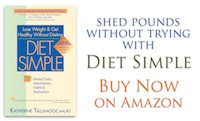Katherine discusses a healthy vegetarian diet with Chef Emeril Lagasse on Discovery Channel’s “Emeril Green.”
- At December 07, 2010
- By Katherine
- In Articles
 0
0
Vegetarianism is a lifestyle which many studies find promotes good health. However, it must be practiced with knowledge in how to get appropriate protein and nutrients.
There are mainly two types of vegetarians: vegans, those who eat only plants and lacto/ova vegetarians, those who will also consume animal by-products such as dairy and eggs. In order to get levels of the nine essential amino acids equal to the highest quality protein, vegans (those who eat only plant foods) must eat soy protein, the only vegetable protein as complete as animal protein, or mix beans and grains and receive Vitamin B-12 supplementation (only found in animal products). If not done carefully, vegans also risk low levels of calcium, vitamin D, and iron.
On the other hand, lacto-ova vegetarianscan receive complete proteins in the animal by-products (dairy and eggs) they consume, as well as by eating soy protein and mixing beans with grains each day.
You should eat a high quality protein at each meal. To determine your protein needs, read:
The American Dietetic Association has developed this “Daily Food Guide for Vegetarians”
Milk and Milk Alternatives Group: 6 to 8 servings daily
- 1/2 cup milk, yogurt, fortified soymilk
- 3/4 oz. natural cheese
- 1/2 to 1 cup cottage cheese
- 1/4 cup calcium-set tofu
- 1 cup cooked dry beans (soy, white, navy, great northern, kidney)
- 1/4 cup almonds
- 3 Tbsp Sesame Tahini or Almond Butter
- 1 cup cooked or 2 cups raw bok choy, Chinese cabbage, broccoli, collards, kale, okra
- 1 Tbsp blackstrap molasses
- 5 Fig
Dry Beans, Nuts, Seeds, Eggs, and Meat Substitutes Group: 2 – 3 servings daily
- 1 cup cooked dry beans, lentils, or peas
- 2 cups soy milk
- 1/2 cup tofu or tempeh
- 2 ox. vegetarian “meats” or soy cheese
- 2 eggs or 4 egg whites
- 1/4 cup nuts or seeds
- 3 Tbsp nut or seed butters
Fruit Group: 2 – 4 servings daily
- 3/4 cup juice
- 1/4 cup dried fruit
- 1/2 cup chopped, raw fruit
- 1/2 cup canned fruit
- 1 medium size piece of fruit such as banana, apple or orangeVegetable Group: 3 – 5 servings daily
- 1/2 cup cooked or chopped raw vegetables
- 1 cup raw, leafy vegetables
- 3/4 cup vegetable juice
Bread, Cereal, Rice, and Pasta Group: 6 – 11 servings daily
- 1 slice (1 ounce) bread
- 1/2 small bagel, bun or English Muffin (or 1 ounce)
- 1 ounce ready to eat cereal
- 2 Tbsp Wheat Germ
- 1/2 cup cooked (1 ounce dry) grains, cereal, rice or pastaSaturated Fats, sweets: use sparinglyOther essentials for those who consume little or no animal products:
- Vitamin B-12 fortified foods or a supplement
- Vitamin D-fortified foods or a supplement
- Omega-3 Fats: 1 to 2 daily servings; 1 tsp flaxseed oil, 3 Tbsp walnuts, 4 tsp canola oil
For more fabulous tips and simple, effective ways to lose weight,
buy her book, Diet Simple!









